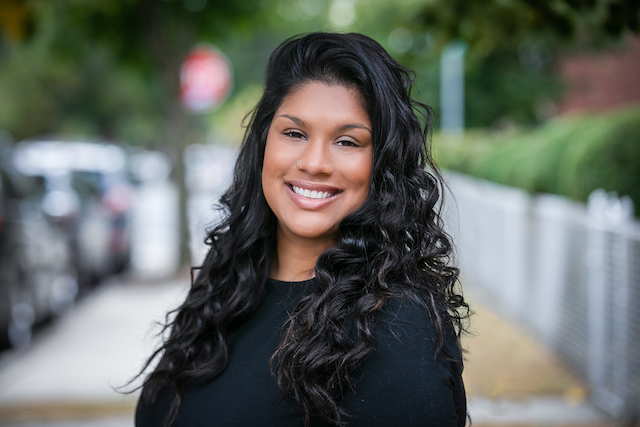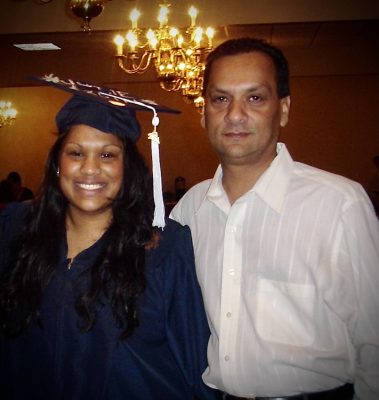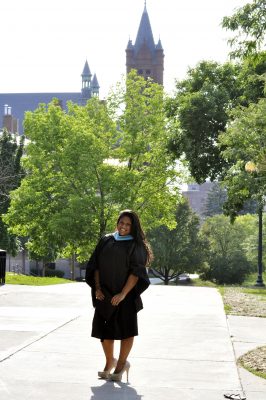Syracuse University created Current Use Scholarships to meet the needs of students who experienced loss—both financially and in other ways—due to COVID-19. Donors make a $5,000 gift for each of five years that the University immediately uses to assist students with their scholarship and financial aid.
 The success story of her father, an immigrant from South America, inspired Julie Padilla ’11, G’12 to create a Current Use Scholarship for the School of Education and name it for him, the R. Persaud Memorial Scholarship.
The success story of her father, an immigrant from South America, inspired Julie Padilla ’11, G’12 to create a Current Use Scholarship for the School of Education and name it for him, the R. Persaud Memorial Scholarship.
“As a first-generation American, a first-generation college graduate, the idea of giving back to Syracuse University, a place I called home during my undergraduate and graduate studies, truly resonated with me,” says Padilla, a former social studies teacher and now assistant principal at Rochdale Early Advantage Charter School in Queens, New York. She received an Ed.D. in educational leadership from Northeastern University in 2020.
A native of Guyana, her father came to the United States as a small child. He started an aircraft repair station near John F. Kennedy International Airport in New York City in 1995. The company performed maintenance and alteration on aircraft and aeronautical products for carriers ranging from UPS and Air China Cargo to American Airlines and Lot Polish Airlines. He died nearly five years ago at age 55.

“His legacy is his compassion, his understanding that you can help others around you reach their potential, that even though you are a single person you can have a profound effect on so many lives, and that should never be forgotten,” Padilla says.
Her parents always gave back, she says, so she followed their sense of philanthropy.
“I am forever grateful for Syracuse, forever Orange, and it made sense based on the ability to contribute to this amazing institution while making a large impact simultaneously,” Padilla says.
As an undergraduate at Syracuse, she was a dual major in history and social studies education 7-12, then received a master’s degree from the School of Education in literacy education 5-12. In 2017, she completed a second master’s degree, in school building and school district leadership from Touro College.
As a social studies teacher at John V. Lindsay Wildcat Academy Charter School in Bronx, New York, from 2012 to 2020, she applied the best lesson she’d learned at the SOE, “the concept of understanding.”
“I learned that understanding requires patience, it requires growth, it requires listening, and you need to do that for everyone you encounter,’’ she says.
When she was teaching, she says she would work to learn exactly who each student was.

“I would care about the person behind the learner and the student,” Padilla says. “Hearing the stories that young people had, hearing their perspective, hearing more about their identity allowed me to connect with them, learn from them and really think about how I can not only teach them but work to ensure I was teaching them so much more than just content knowledge.”
As an assistant principal, it is imperative “to embed aspects of culture, of social justice, of current events into what we do daily, into the education we are providing young people,” she says.” We need to empower the youth of today so they feel equipped and more importantly so they have the tools at their disposal to craft the change they deem necessary.”
In the community she has been elected to the board of directors of both Lit World—which works with children worldwide to learn the power of reading, writing and storytelling—and Grace Outreach Bronx—which helps women enhance their academic skills, pursue higher education and find employment.
Her time at the School of Education helped her realize a successful educator and professional needs to be open-minded, self-aware and understand what it means to be a leader. A leader, she says, must display empathy, transparency in communication, selflessness and honesty with others.
“Being a leader involves a drive, an integrity about what you do and how you do it, having a sense of humility, but also being resilient through it all.”
